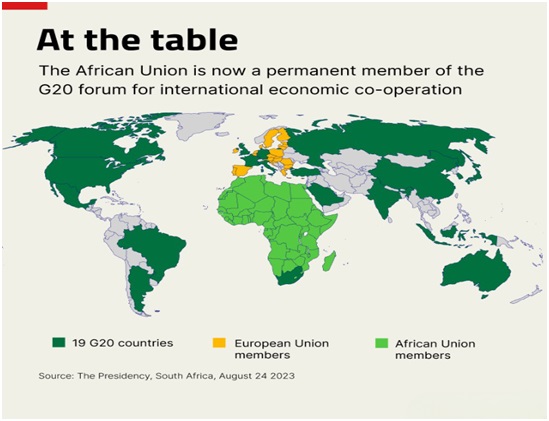African Union Joined G20 (G20 Becomes G21) (The Hindu)

- 11 Sep 2023
Why it is in News?
At the 18th G20 Summit in India, the African Union (AU) became a new member of the G20, just three months after India proposed the idea of their inclusion.
Context:
- In June of this year, Prime Minister Modi suggested to G20 leaders that the African Union should be granted full membership at the upcoming G20 Summit in Delhi.
- This idea was born after the 'Voice of the Global South' Summit in January 2023, which saw participation from most of the African Union's 55 member countries.
- Up to that point, only one country from the African Union, South Africa, was a part of the G20.
- Several African leaders had emphasized that Europe had representation from five countries and the European Union (EU) within the G20, and they believed the African Union deserved similar representation.
What is the African Union (AU)?
- The African Union (AU) is a group of 55 member states representing the countries of the African Continent.
- In essence, it's a union that has various objectives aimed at enhancing the well-being of its member countries, both on their own and as a collective.
- It was formally established in 2002, succeeding the Organisation of African Unity (OAU, 1963-1999).
- The AU's main offices are located in Addis Ababa, Ethiopia.
Vision of the African Union (AU):
- The AU is driven by its vision of "A united, prosperous, and peaceful Africa, led by its own people and serving as a dynamic force on the global stage."
- To accomplish this mission, a target year of 2063 has been established, marking the 100th anniversary of the OAU's establishment.
- Agenda 2063's key objectives include:
- Fostering prosperity in Africa through inclusive growth and sustainable development.
- Achieving a politically unified and integrated continent, inspired by the principles of Pan-Africanism.
- Cultivating a Africa characterized by good governance, democracy, human rights, justice, and the rule of law.
- To realize the aims outlined in Agenda 2063, the AU has devised a series of five 10-year plans, with the initial plan spanning from 2014 to 2023.
Objectives of the African Union (AU):
- The AU dedicates its efforts and resources to fostering stronger unity and solidarity among African nations and their citizens.
- Its goal is to expedite the political and socio-economic integration of the continent, addressing the diverse social, economic, and political challenges faced by African nations.
- Additionally, the AU actively works to promote peace, stability, and security throughout the region.
The Role of the AU in Promoting Peace on the Continent:
- The AU strongly believes that resolving conflicts is essential for achieving prosperity.
- In pursuit of this goal, it established a Peace and Security Council in 2004.
- This council has the authority to intervene in conflicts, replacing the principle of non-interference with one of non-indifference.
- It can deploy military forces in situations involving genocide and crimes against humanity and can authorize peacekeeping missions.
- The AU also oversees the New Partnership for Africa's Development (Nepad), an anti-poverty plan that offers a partnership with the West.
- It promotes good political and economic practices in exchange for increased aid and investment.
- Many of the AU's peacekeeping missions have been instrumental in helping governments combat terrorism across Africa, from the Sahel to northern Mozambique.
- Diplomatic efforts by the AU have also successfully resolved conflicts in Africa, such as brokering a peace deal between the Ethiopian Government and the Tigray People's Liberation Front (TPLF) in South Africa in 2022.
- Another notable achievement is the establishment of the African Continental Free Trade Area (AfCFTA), which became operational in 2021.
- With 54 member countries as signatories, AfCFTA is the world's largest new free trade area since the creation of the WTO in 1994.
- Its aim is to boost intra-African trade by implementing deeper trade liberalization and improved regulatory harmonization.
- The AfCFTA is projected to increase Africa's income by $450 billion by 2035 and elevate intra-African exports by more than 81%.
Limitations of the African Union (AU):
- The AU has faced challenges in preventing coups in Africa, with over 200 coups occurring on the continent since the 1960s. Some of the most recent ones happened in Gabon and Niger.
- Another issue is the AU's struggle to ensure that its member nations fulfill their annual financial obligations.
- This has led to financial constraints, forcing the organization to rely on external funding, which can affect its independence.
